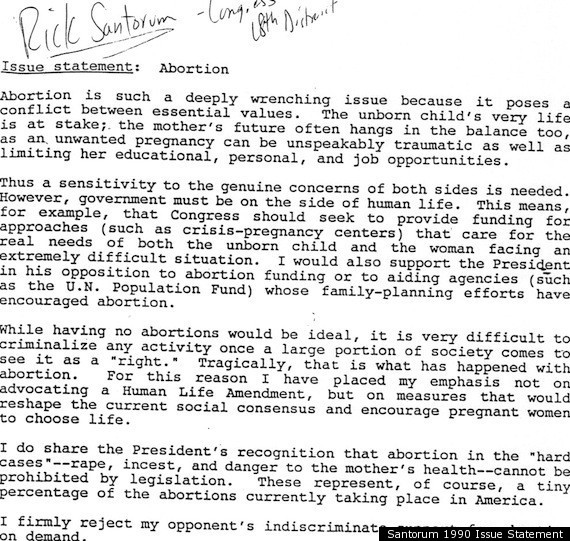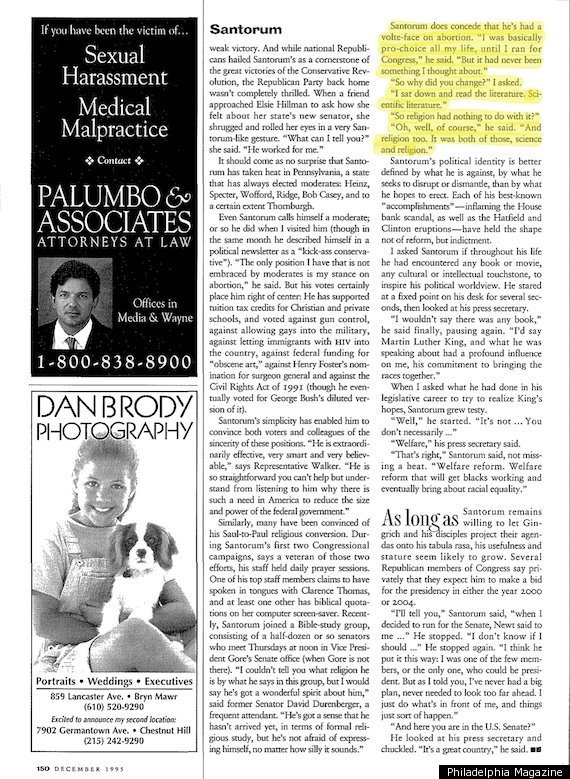WASHINGTON -- Prior to entering public office, former Pennsylvania senator Rick Santorum was a self-admitted pro-choice Republican unwilling to dabble in the cultural conservative politics that now defines his presidential campaign, a review of old campaign documents and interviews shows.
This past week, the Pennsylvania Republican-turned-GOP primary frontrunner made a number of eyebrow raising statements meant to demonstrate an uncompromising posture on social issues. He's questioned President Obama's theology, argued that prenatal testing is a form of eugenics, and stated his opposition for contraception funding.
His campaign has insisted that these are side issues, but when pressed during an interview with MSNBC on Tuesday morning, Santorum's top spokesman Hogan Gidley exulted in his boss' consistency on such topics.
"I mean, that's who he is," Gidley said. "He doesn't have to tack to the right on social issues like Mitt Romney because he actually firmly believes those things."
But Santorum didn't always have such conviction on social policy. In his first run for office in 1990, his campaign put out an issue statement on abortion that, by today's standards, would put him among the moderates of the GOP. Abortion, he wrote, requires "a sensitivity to the genuine concerns of both sides." While "government must be on the side of human life" he recognized that " it is very difficult to criminalize any activity once a large portion of society comes to see it as a 'right.'"
In practical terms, this meant opposing funding for agencies "whose family planning efforts have encouraged abortion" and support for "approaches (such as crisis-pregnancy centers) that care for the real needs of both the unborn child and the woman facing an extremely difficult situation." It also meant that he would not place emphasis on "advocating a Human Life Amendment" and that "abortion in 'hard cases' – rape, incest, and danger to the mother's health – cannot be prohibited by legislation."
During the 2012 presidential campaign, Santorum has argued that those exceptions should not be granted.
The 1990 issue statement was sent to the Huffington Post by an operative who worked on that campaign. Gidley did not return a request for comment on the matter. As for its validity, a second Democratic source separately said he was "pretty sure" that was the same document. The statement was referenced in several newspaper articles from that campaign, including a Pittsburgh Press report that noted he withdrew the statement "after settling on a position opposing most forms of legalized abortion."
The senator also discussed his pro-choice origins in an interview he gave five years after defeating Rep. Doug Walgren.
In a December 1995 Philadelphia Magazine article -- which the Huffington Post pulled from Temple University archives -- Santorum conceded that he "was basically pro-choice all my life, until I ran for Congress... But it had never been something I thought about." Asked why he changed his mind, he said that he "sat down and read the literature. Scientific literature," only to correct himself and note that religion was a part of it too.
Elsewhere in the piece, an anonymous "prominent Republican active in Planned Parenthood" said that Santorum was identified in 1990 as a pro-choice lawmaker. "No one here had identified him as anti-choice," the Republican said. More telling was the quote offered by Tom Allen, a Pittsburgh-based OBGYN who had co-founded the city's first abortion clinic, delivered Santorum's wife, Karen, and gone on to share an apartment with her.
"When Karen told me she was moving out," Allen said, "she said, 'You'd really like Rick. He's a lot like you. He's politically active and he's pro-choice.'"
Walgren, likewise, had difficulty recalling abortion playing much, if any, role during his 1990 campaign against Santorum. In an interview with the Huffington Post, the former congressman relayed that it was his understanding that Santorum canvassers "were deliberately instructed not to wear a red rose [symbolizing support for the pro-life movement] in canvassing," and that the literature they distributed "had no mention of abortion in it."
Those who knew Santorum before he entered politics testify to a similar posture. Mark Podvia, who graduated with Santorum from Dickinson School of Law in 1986, said that the issue of abortion or "Christian Faith" never came up either in class or in casual talks.
"I honestly don't remember ever discussing abortion with him," he told the Huffington Post. "He and I had talks over lunch and we would talk military affairs. He was always for a strong defense. That was one point where we would come to agreement. That's the only thing I really remember talking to him about."
That Santorum evolved from someone with pro-choice leanings into a hard-lined pro-lifer is not unique. Many Republicans and even some Democrats have made a similar evolution over the course of their political histories. Included on that list is Mitt Romney, the man Santorum is now competing with for the Republican presidential nomination.
"Santorum is a product of the polarization of our politics," said Pat Ewing, the former campaign manager for Senator Harris Wofford, whom Santorum defeated in the 1994 election. "He has taken advantage of it. He understands it. And he will take a position to benefit himself to get a small group of people to love him adamantly. His personality hasn't evolved, his politics has."
Original Article
Source: Huff
Author: Sam Stein, Jason Cherkis



No comments:
Post a Comment